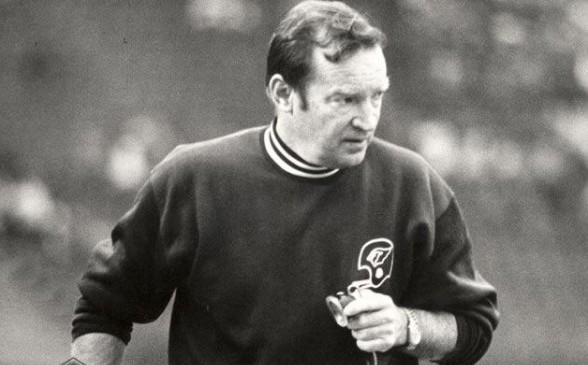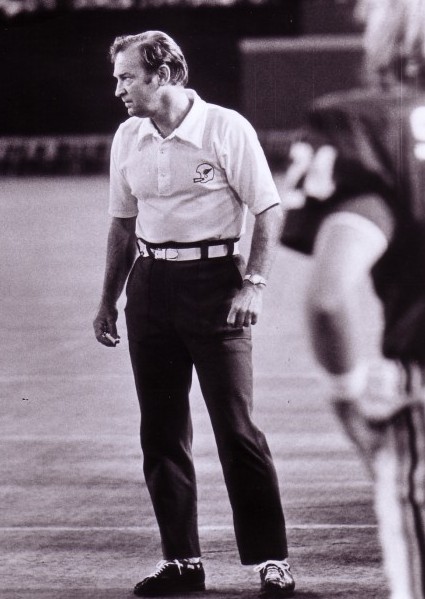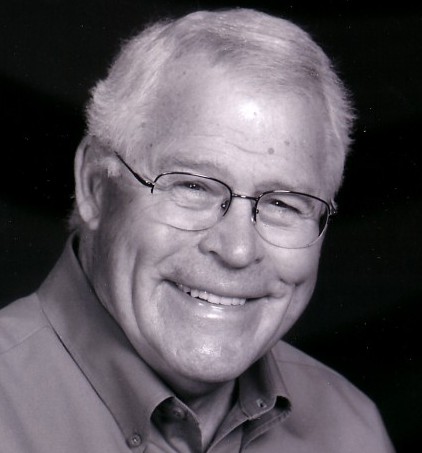
Founded in 1960 by Clay Huntington, a longtime Northwest sportscaster who died in June at age 89, the State of Washington Sports Hall of Fame annually recognizes the achievements of athletes, coaches, administrators and media members who have contributed significantly to the sporting culture of this corner of the country.
The Hall welcomed three more inductees this week, bringing its membership to 175, and all three are deserving, if belated, additions.

The late Don Coryell, a football coach at the college and pro levels, earned enshrinement after a career notable for its groundbreaking creativity. Sportscaster Bruce King also made it, as did Chuck Bobo Brayton, the former Washington State University baseball coach.
King spent 30 years as a sports director/anchor at KOMO-TV, where he became synonymous with Washington Huskies football and basketball broadcasts. King also covered the Seahawks, Sonics, Mariners and Sounders, and four times was selected the states Sportscaster of the Year by his peers.
Brayton served as head coach of the WSU baseball program from 1962-94, during which he compiled a record of 1,126-523-8, best in school history. Under Braytons guidance, the Cougars made two appearances 1965 and 1976 — in the College World Series and won 21 conference titles.
Few men influenced the development of his sport more than Coryell, who played defensive back — rather anonymously — at the University of Washington from 1949-51 (he earned one letter on the Don Heinrich–Hugh McElhenny-led teams), but didnt start to carve a name for himself until after he launched a 29-year-coaching career, most of it outside of the state.
After graduating from UW, packing both bachelors and masters degrees, Coryell whisked through the University of British Columbia, Wenatchee Valley College, Whittier College and USC (worked under John McKay) before landing at San Diego State in 1961 (two of Coryells better-known assistants: John Madden and Joe Gibbs).
There, Coryell became a pioneer of the I formation,but gradually moved away from the I while developing a passing attack centered around future NFL star Brian Sipe that would make him famous and, more important, be copied throughout the collegiate ranks and NFL.
While Bill Walsh is widely — and correctly — credited with popularizing the West Coast offense during the 1980s with the Joe Montana-led San Francisco 49ers, all Walsh really did was ape what he had seen Coryell do at San Diego State two decades earlier, and later with the San Diego Chargers, when his offense evolved into Air Coryell.
Coryells Chargers were laden with 3,000-yard passers, 1,000-yard rushers and 1,000-yard receivers. But we like this quick illustration of Air Coryell: On Jan. 2, 1982, in an epic 41-38 playoff win over the Miami Dolphins, Coryell trotted out a 400-yard passer (Dan Fouts, 433), a 100-yard rusher (Chuck Muncie, 120), and THREE 100-yard receivers (Kellen Winslow, 166; Charlie Joiner, 198; Wes Chandler, 106).

That is, to paraphrase Foghorn Leghorn, the most unheard of thing weve ever heard of, or at least one of them. In 35 seasons, the Seahawks have had just one game with a 300-yard passer (Matt Hasselbeck, 328), a 100-yard rusher (Shaun Alexander, 127), and two 100-yard receivers (Koren Robinson, 122; Darrell Jackson, 102) on Nov. 30, 2003, vs. Cleveland.
“Because of Air Coryell, nickel and dime defenses became an every-game proposition in the NFL,” said former Chargers running back Hank Bauer. “Coryell changed the way the game is played today.”
In the aftermath of Coryells July, 2010 death at age 85, his former tight end, Kellen Winslow, said, They call it the West Coast offense because San Francisco won Super Bowls with it. But it was only a variation on what we did in San Diego: Joe Gibbs itty-bitty receivers on the outside and two tight ends in the middle. Thats a variation of Coryells offense in San Diego. Its just a personnel change, but its the same thing. When the Rams won their Super Bowl (XXXIV), it was the same offense, same terminology.
Fans cant watch the NFL today and not see Don Coryells influence. And thats why he should be in the Pro Football Hall of Fame, as an innovator and as a contributor to the game. You cant put a dollar figure on his value to professional football.
Added Dan Fouts: I wouldnt be in the Pro Football Hall of Fame without Don Coryell.
The first former UW player to coach in the NFL (second and last was Jim Mora Jr. with Atlanta and Seattle) and the only coach to win more than 100 games at both the collegiate and professional levels, Coryell is now a member of five Halls of Fame: College Football, San Diego State, Husky Fever, San Diego Chargers and State of Washington.
Notably missing from an otherwise eye-popping portfolio: Coryell is not yet a member of the Pro Football Hall of Fame (he was a finalist for the first time in 2010), a fact mainly attributed to his failure to win the Super Bowl and a dull 3-6 postseason record.
But when Coryell missed enshrinement in Canton in 2010, former Colts head coach Tony Dungy remarked, If you talk about impact on the game, training other coaches John Madden, Joe Gibbs, Bill Walsh, to name a few and influencing how things are done, Don Coryell is probably right up there with Paul Brown. He was a genius.
Said Winslow: For Don Coryell to not be in the Hall of Fame is a lack of knowledge of the voters. That’s the nicest way that I can put that. Its a lack of understanding of the legacy of the game.”
Fortunately, the Washington Sports Hall of Fame didnt misinterpret Coryells contributions, or his legacy, properly enshrining him this week, along with the equally deserving King and Brayton.

1 Comment
umm. “. Hernandez struck out a dozen, getting the side in order in the sixth
and eighth innings and getting two strikeouts in the ninth, including
freezing No 9 hitter Sean Rodriguez with a change-up for a called third
strike to end the game.”
He got the side in order EVERY inning. He struck out the side in the 6th and 8th.
Nitpick aside–Felix’s crown sure fits. King indeed.